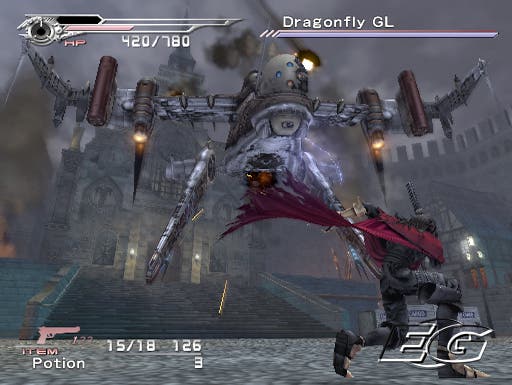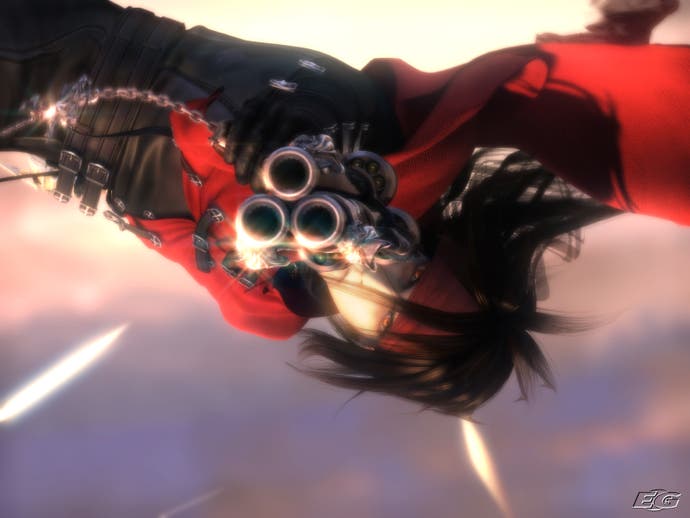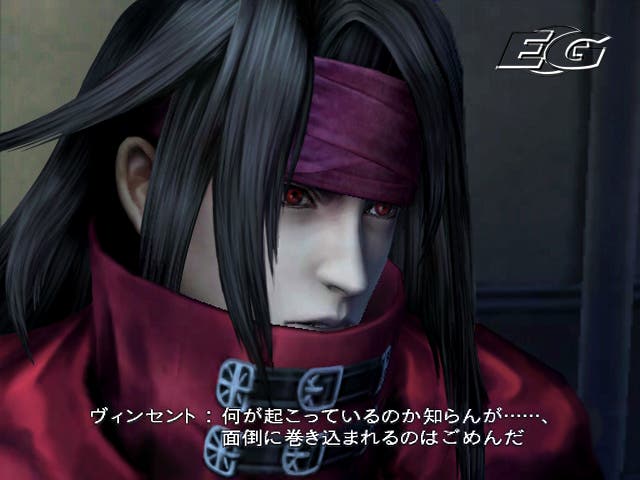Final Fantasy VII: Dirge of Cerberus
Devil May Cutscene.
First, a declaration of interest. Final Fantasy VII is the most important game I ever played. Not the best game - far from it - and not even the best game in the series, but to me personally, the most important. It was the game which showed a young technology journalist embarking on a move into political writing that there was more to videogames than just shooting my friends in the face for a bit of competitive stress release; which opened up the my mind to the concept of interactive storytelling; which made me buy my first videogame console and changed the path of my career to the point where, around ten years later, videogames are my life. Thanks, Final Fantasy VII - were it not for you, I coulda' been somebody. Still, the point is, FFVII was an important videogame to me, and that might colour my perception of today's topic at hand - I just thought you should know.
What we're dealing with today is the latest in Square Enix' ongoing "Compilation of Final Fantasy VII" series, a number of games (and a movie) which return to the characters and the world of their epic, legendary PlayStation RPG and fill in the gaps before, after and even during the story of the game. Branching out beyond the relatively traditional RPG gameplay seen in FFVII itself, the Compilation titles offer new additions to the game as diverse as a full-length computer animated movie, a mobile phone game where you take pictures on the phone camera to cast different types of spell, and in this instance, a hybrid first- and third-person action game.
Alarm bells - whoop! Whoop! Square Enix' reputation with action games is patchy, to say the least - so much so that the company has mostly avoided that field in the recent past, with Kingdom Hearts and its sequel being the closest the RPG specialist has come to direct action. Dirge of Cerberus, however, is an action game to its very core - essentially a first person shooter, it's a game very different to any in Square's recent back catalogue, and seems like a terribly risky gamble when you consider the value of the FFVII franchise which the team has attached to the game.

My Bloody Valentine
The risk of failure seems even higher when you consider the decisions made regarding the characters of the game. Rather than choosing sword-wielding Cloud, machinegun-wielder Barrett or breast-wielder Tifa (oh, alright, she fought with her fists - but you know full well what the main hook of any game she starred in would be) as the central character, the developers opted to build Dirge of Cerberus around the moody, mysterious, but crucially optional character of Vincent Valentine. Vincent isn't a character who will be instantly familiar to many, even people who have played FFVII - and his primary sidekicks in the game are no better. Yuffie, another optional character from FFVII (although admittedly one which far more players will be familiar with) pops up frequently in the game with great fanfare - while Reeve, a character whose role in FFVII was sufficiently obscure that I had to look him up before I could work out who the hell he was, is a pivotal part of the game. Only Cait Sith - a bizarre cat creature who was a core party member in FFVII and who is actually playable in a few sections of Dirge - is guaranteed to be recognisable to players of the original game.
That isn't to say that Vincent and his cohorts haven't made an impact on fans of the game - indeed, a poke around the Internet reveals that he's one of the most common characters to appear in fanart and fan-fiction about FFVII, and worryingly, there's actually someone in the UK who has changed his name by deed poll to Vincent Valentine, a level of dedication which we can only reasonably ascribe to being utterly mental. However, the relative obscurity of the central characters in Dirge is a weak point of the game - not least because the plot relies to quite an extent on recognition of the central characters, a fact which will not only frustrate those who can't for the life of them remember what role people like Reeve, Vincent and Hojo played in proceedings, but which completely alienates anyone who hasn't played FFVII. That's fair enough to some extent - this is a companion title, after all - but with better script writing and more focus on introducing and developing the existing characters rather than assuming that we'd all be familiar with them, the developers could have made a much more accessible game. As it is, I felt like playing the game with wikipedia open on another screen half the time.

That's a shame not least because the actual plotline and its presentation is excellent, and for those familiar with the world of Final Fantasy VII, is unquestionably the high point of the game. Set after the events of the original game, and indeed after the events of Advent Children, Dirge of Cerberus sees an unwilling Vincent being conscripted to help out Reeve - now running a United Nations style bunch of do-gooders called the WRO - when a rebel group of genetically modified soldiers called Deepground start kidnapping civilians and causing all manner of trouble. Along the way, Vincent's own dark past turns out to be tied up in what it is that Deepground are seeking, and of course, the fate of the planet (not that again!) is at stake... The story of the game is related through lengthy cutscenes, both stunning rendered videos and, more often, excellent in-engine scenes which are directed with a level of style and talent that wouldn't be out of place in a Metal Gear Solid game.
In a sense, though, that's part of the problem with Dirge of Cerberus - the game's cutscenes are good enough to be in Metal Gear Solid (and that's high praise indeed), but they're also lengthy and frequent enough to be in Metal Gear Solid 2. In-engine scenes can occasionally break up the gameplay for ten minutes at a time, and while the scenes are very nice to watch, there's a strong feeling that Square Enix would prefer to be making Advent Children 2 rather than actually building an interactive game - a style of design which they broke away with more recently with the superb Final Fantasy XII, but which is still sadly evident here.

Devil Cuts Onions
During the periods where you're actually playing the game rather than watching the plot unfold, Dirge of Cerberus opts for a play style which initially seems to ape Devil May Cry - a combination of ranged (gun) and melee attacks, a protagonist leaping around the place with a balletic double-jump and a flowing red cape... The comparisons are easy and obvious. However, while the default viewpoint in the game is third-person, and there's a double jump move and a melee combo move, the designers of Dirge appear to have pulled back from making a Devil May Cry style action game in favour of focusing on Vincent's handy skills with a range of guns, resulting in a game which owes much more to the first-person shooter genre than to anything else.
That, however, is not a forgiving genre - and Square Enix are babes in arms when it comes to developing FPS games. A number of interesting aspects are introduced by Dirge of Cerberus regardless; in particular, the ability to build three custom weapons in your options screen from a variety of components, and then cycle through them in combat at the touch of a button, is an excellent addition that makes the whole game far more intelligent than it would be with simple weapon pickups. However, that cannot rescue Dirge of Cerberus from the fact that it is pathetically backwards as FPS games go - with stupid enemies whose AI would have been embarrassing five years ago, unimaginative bosses and dull, repetitive level design.
The designers attempt to break up the monotony of the game by introducing sub-missions in each level, which contribute to your overall score (which can be redeemed either in experience points, allowing you to level up, or in Gil, allowing you to buy items and upgrades) at the end of each stage - and to some extent, they do succeed, as trying to defend civilians or assist WRO troops makes the experience much more interesting. However, the "thirty seconds of fun" theory can be brought to bear here, and Dirge of Cerberus is found wanting - the simple experience of running through rooms or areas shooting enemy soldiers isn't fun, tense or exciting. It's dull, and that's a terrible criticism to have to make of a game.

That's not helped by the fact that the game is also shockingly easy; it may be that Western fingers are altogether more used to playing FPS games than those of the audience Square Enix had in mind, but regardless, the fact remains that even on the tougher difficulty setting it's unlikely you'll die even once while playing through the game, unless you do something really daft. Extra challenge stages do add to the difficulty a bit, but ultimately it feels like the designers had to make a choice between providing players with a smoother, more reactive control system that gave them a better chance of controlling the action, and just making the game so easy that enemies fall like a shooting gallery. I guess the latter option is easier.
Metal Gear Stupid
That's all depressingly, overwhelmingly negative. I say "depressingly" because the fact is that Dirge of Cerberus isn't a bad game, as such - it's just crushingly average in the gameplay department, bordering on dull at its lowest ebb and never even touching the lofty firmament marked "inspired". What lifts the game is its world-class presentation; the graphics are utterly superb, and are a timely reminder of what the PS2 is capable of when a talented developer gets its hands on the aging system, the cutscenes are presented with panache and style, the voice acting is great (reusing, as it does, the voice actors from Advent Children) and the music is absolutely remarkable, with truly fantastic melodies that mix in elements of Final Fantasy VII's score with new themes devised especially for this game.
All of which should go some way to recommending this game to die-hard fans of Final Fantasy VII - not because it's fun, as such, but because it's a very well-presented chunk of the FFVII "experience", an engaging piece of storytelling for existing fans and not actually offensive to play so much as simply not very engaging. For anyone who isn't desperately in love with FFVII; though - in other words, if you've never written erotic gay fanfiction about Cloud and Sephiroth, drawn fanart of Tifa engaged in a bestial act with Red XIII, or considered changing your name to Vincent Valentine - it's impossible to recommend Dirge of Cerberus as anything other than a curiosity.

